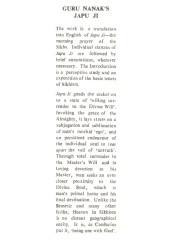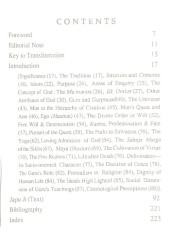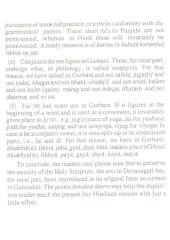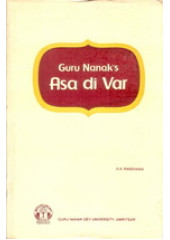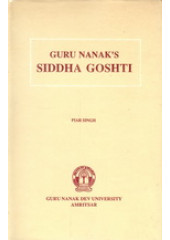Monday to Saturday - 10:00 Am to 9 PM
Now Enjoy Bulk Discounts on Books as Mentioned Below
These Discounts are in addition to the Discounts on Individual Books (Visible as Bulk Discount for Books in Cart)
Extra 10% Off If Books Purchased Exceeds Rs 3000 or 75 USD or 60 GBP or 60 Euro or 100 AUD or 100 CAD
Extra 15% Off If Books Purchased Exceeds Rs 6000 or 150 USD or 120 GBP or 120 Euro or 200 AUD or 200 CAD
Extra 20% Off If Books Purchased Exceeds Rs 15000 or 225 USD or 180 GBP or 180 Euro or 300 AUD or 300 CAD
Extra 25% Off If Books Purchased Exceeds Rs 30000 or 300 USD or 240 GBP or 240 Euro or 400 AUD or 400 CAD
Foreword To 'Guru Nanak's Japu ji' By G.S.Randhawa
The quincentenary of Guru Nanak, the founder of the Sikh faith, prompted this book's first edition about two and a half decades ago. Lately, even as it was-planned to take out its second edition, a friend suggested that it might be advisable to recast and expand it so as to have it cater to the more discerning of English-knowing readership. Also, it should meet the needs of the second generation of emigrant Sikhs who, having stayed away from their native milieu a bit too long, have by now but only a faint acquaintance with their ancestral language and tradition; and are perforce obliged to converse and think in English. The second edition appeared in 1990 in pursuance of that suggestion. It embodied the text of the Japu Ji in its original form, i.e., Gurmukhi, its transliteration in Roman and a totally revised rendering of the text in English together with copious notes so as to enable the reader to appreciate the true import of the sublime composition.
After a reprint issued in 1992, the third edition came up in 1994 embodying further efforts to improve the rhythmic pattern of the rendering in English. Besides, care was taken to convey the involved meaning of the original text a bit more explicitly, without of course sacrificing the aptness of the English idiom, as is germane to ecumenical writing in English. The Introductory part of the book too was then further elaborated and made to cover a few new areas. This enabled the book to cover comprehensively atleast the basic feature of the present edition too. Another improvement, that was wrought then for the benefit of the Devanagari-knowing readers, was the addition of the Devanagari version of the Japu Ji along with Punjabi. The Roman transliteration appeared below the Devanagari script; and it was so devised as to make it conform to its pronunciation in Punjabi. All these features have been retained in this edition too.
Earlier editions having received good response, the present, i.e., the fourth edition, has been further revised to include fresh supplementing material wherever necessary.
'Poetry', critics say, 'is untranslatable'. This is very much so, when treatises of profound mystical import of a certain language and milieu are sought to be rendered into another an altogether alien one. In the case of Japu Ji, the task is still more challenging because of the extreme terseness of its language. Guru Nanak's primary object was to drive his message home to the common folk, who had for centuries been nursed and saturated in the traditional Indian idiom and symbols. He has therefore had to invariably draw heavily on its past folk and literary heritage. This precludes examination of his compositions and individual verses in isolation. Scrupulous care has hence been taken to interpret Japu fl in close conformity with the broader frame-work of his philosophy. Attempt has also been made to bring out the true spirit of his utterances and yet adhere as close to the original text as possible. Particular care has been taken to ensure that the true purport of involved expressions and subtle nuances of the verses be made explicit in the course of the translation itself.
In this task of recasting and revamping this work, I have been greatly helped by Dr. Piar Singh, Professor (Retired) of Guru Nanak Dev University. He and I have had long sittings to discuss the much-involved meaning of the verses; in which process he, with his profound background of Indian classical tradition and lore, has been of much help to me. Besides, he has been of great help in seeing this book through the press.
About The Author Of 'Guru Nanak's Japu ji'
Prof. G.S. Randhawa, ExVice-Chancellor, Guru Nanak Dev University, Amritsar is an academician of repute and an educational administrator of rare distinction. He has had a professional standing of nearly five decades; and has delivered extension lectures on a wide variety of subjects at some of the foremost universities of the world.
Though his basic discipline is English Literature, yet he has for long been a keen student of Sikh Studies and Comparative Theology. His firm commitment to Sikhism not with standing, he combines the same with a rare mix of catholicity of approach to other religious beliefs and to viewing of things with a well-grounded belief that 'Truth has never been nor can or shall ever be the sole monopoly of any single creed.'
| Books | |
| Author | G.S.Randhawa |
| Pages | 225 |
| Cover | Hardbound |
| Language | English |
Guru Nanak's Japu ji - Book By G.S.Randhawa
- Brand: Guru Nanak Dev University
- Product Code: GURE129
- Availability: Out Of Stock
-
Rs.200.00
Related Products
Guru Nanak's Asa di Vaar - Book By G.S.Randhawa
Foreword To 'Guru Nanak's Asa di Vaar' By G.S.Randhawa Probably with the sole exception of the Au..
Rs.225.00
Guru Nanak's Siddha Ghosti - Book By Piar Singh
Preface To 'Guru Nanak's Siddha Ghosti' By Piar Singh During the days of my association wit..
Rs.240.00
Japuji - Translation and Transliteration - Book By Surinderjit Singh , Dr. Balkar Singh
Summary of 'Japuji - Translation and Transliteration' By Surinderjit Singh & Dr Balkar Singh&..
Rs.50.00
Tags: gurbani essence, gurbani explained, gurbani meanings english, gurbani message, gurbani steeks, gurbani teekas, sikh gurbani books english, sikh gurbani english translation guru, nanak, japu, g.s.randhawa


